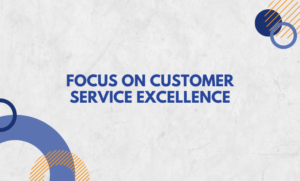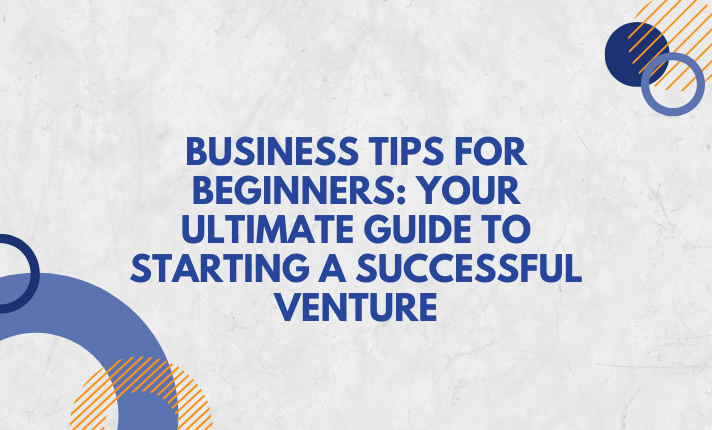Starting a business is a big step, and it can be overwhelming, especially for first-time entrepreneurs. Whether you’re thinking about launching a small business or scaling up an idea, understanding the essential strategies can set you on the right path. In this guide, we’ll break down key business tips for beginners need to know, so you can confidently move from an idea to a fully operating business.

Define Your Business Idea Clearly
The first and most crucial step in starting a business is defining your business idea. A well-defined business concept can serve as the foundation for your entire venture. It’s essential to understand the problem you’re solving and the unique value your business will bring to the market.
Tips for Defining Your Business Idea:
- Research existing solutions in the market.
- Identify your target audience.
- Determine your competitive advantage.
By taking the time to clearly define your idea, you’ll create a blueprint that will guide all future decisions and actions.

Conduct Market Research to Validate Your Idea
Market research is vital to ensure there’s demand for your product or service. This helps you understand customer pain points, market size, and competitors. Without solid research, your business idea may not stand out, or it could fail due to lack of demand.
How to Conduct Effective Market Research:
- Surveys and interviews with potential customers.
- Analyze competitors to understand their strengths and weaknesses.
- Use online tools like Google Trends to spot emerging trends.
Market research will help you minimize risks and make data-driven decisions.

Write a Solid Business Plan
A business plan is a blueprint for your business, outlining your goals, target market, competition, financial forecasts, and marketing strategies. It’s crucial not only for attracting investors but also for keeping you focused on your objectives.
Key Components of a Business Plan:
- Executive Summary.
- Business Description.
- Market Analysis.
- Organization and Management.
- Sales Strategies and Financial Projections.
A well-written business plan is a roadmap that helps you stay on track as your business grows.

Choose the Right Legal Structure for Your Business
The legal structure you choose for your business will affect your taxes, liability, and the amount of paperwork you need to complete. It’s essential to choose the right one from the start to avoid complications down the road.
Common Business Structures to Consider:
- Sole Proprietorship.
- Limited Liability Company (LLC).
- Corporation.
- Partnership.
Each legal structure has different tax and legal implications, so make sure to consult with a legal professional to choose the best one for your situation.

Set Up Your Finances and Budget Properly
Proper financial management is the backbone of any successful business. From setting up a business bank account to keeping track of your income and expenses, financial discipline is essential for long-term sustainability.
Financial Tips for Beginners:
- Separate business and personal finances.
- Keep accurate records of all financial transactions.
- Set a realistic budget and stick to it.
- Consider getting a financial advisor to help with planning.
Having a clear financial plan will help you avoid cash flow problems and keep your business in the green.

Build an Online Presence with a Website and Social Media
In today’s digital world, having an online presence is non-negotiable. A professional website and active social media accounts help build credibility, attract customers, and market your business effectively.
Steps to Building Your Online Presence:
- Build a user-friendly website with essential information like contact details, product offerings, and pricing.
- Use social media platforms like Instagram, Facebook, and LinkedIn to engage with your audience.
- Optimize your website for SEO to ensure it ranks on search engines.
A strong online presence increases visibility and builds trust with potential customers.

Develop a Marketing Strategy
A comprehensive marketing strategy is crucial for attracting and retaining customers. You need to figure out how to reach your target audience and convert them into paying customers.
Key Marketing Tactics for Beginners:
- Content marketing through blogs and social media.
- Email marketing to nurture customer relationships.
- Paid advertising like Google Ads or Facebook Ads.
- Networking and word-of-mouth referrals.
Your marketing efforts should align with your business goals and target audience.

Focus on Customer Service Excellence
Providing excellent customer service is one of the most effective ways to stand out from the competition and ensure customer loyalty. A happy customer is more likely to return and recommend your business to others.
Ways to Provide Exceptional Customer Service:
- Respond promptly to customer inquiries.
- Address customer complaints with empathy and professionalism.
- Offer loyalty programs or incentives for repeat customers.
Investing in customer service will help you build a strong reputation and customer base.

Learn from Failures and Keep Evolving
Every business faces challenges and setbacks. What’s important is how you learn from them. Failure is part of the process, and it can provide valuable lessons for improving your business.
How to Handle Business Challenges:
- Evaluate the situation and learn from mistakes.
- Seek feedback from mentors or advisors.
- Use failures as an opportunity for innovation and growth.
Adapting and evolving your business based on feedback and lessons learned can lead to long-term success.

Stay Consistent and Be Patient
Building a successful business takes time, and results don’t happen overnight. Staying consistent with your efforts, remaining patient, and maintaining a positive mindset will help you push through challenges and reach your goals.
How to Stay Motivated and Focused:
- Set short- and long-term goals.
- Celebrate small wins along the way.
- Keep learning and improving your skills.
Success in business is a marathon, not a sprint. Persistence and consistency will pay off over time.
Conclusion:
Starting a business as a beginner may seem like a daunting task, but with the right strategies and mindset, you can successfully navigate the journey. Follow these essential business tips for beginners, stay focused on your goals, and always be willing to adapt and learn from your experiences.
By clearly defining your business idea, conducting market research, developing a solid plan, and focusing on customer service and marketing, you’ll be setting yourself up for success. The key is to take action and remain persistent through the challenges. Success doesn’t happen overnight, but with the right steps, you’ll be on the path to a thriving business.



